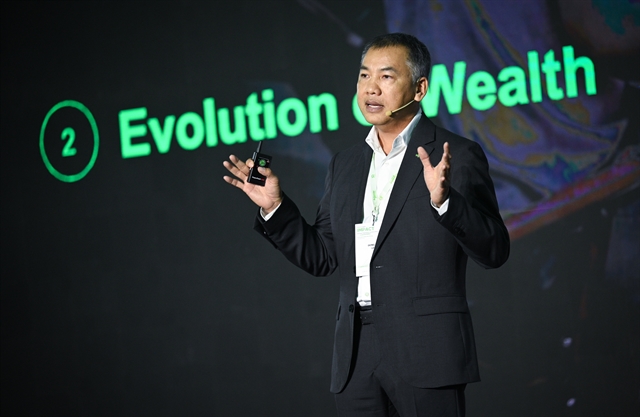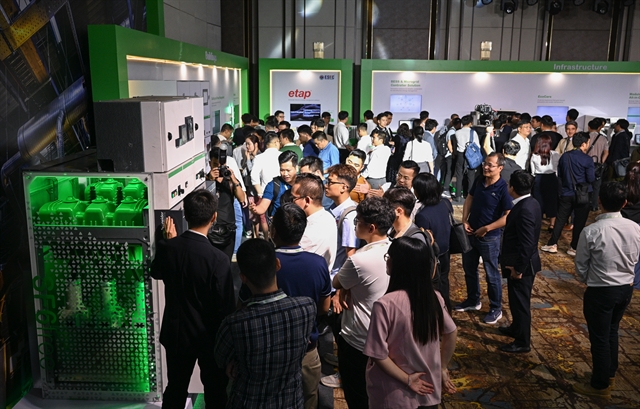Digitisation and artificial intelligence (AI) are poised to become defining forces behind the global energy transition, according to industry leaders at Schneider Electric’s annual Innovation Day 2025 held on Thursday in Hải Phòng.

Vũ Hoa
HẢI PHÒNG — Digitisation and artificial intelligence (AI) are poised to become the defining forces behind global energy transition, according to industry leaders at Schneider Electric’s annual Innovation Day 2025 held on Thursday in Hải Phòng.
The event brought together experts, policymakers and business leaders under the theme 'Sustainable production scale growth through digitisation and AI'.
Speaking at the conference, the General Director of Schneider Electric Vietnam and Cambodia, Đồng Mai Lâm, emphasised that the convergence of digitisation, automation and electrification would play a central role in helping industries meet sustainability goals, including the net zero target by 2050.
“We believe that digitisation and AI will be the main drivers for energy transition in the manufacturing industry through reducing energy consumption, optimising the energy mix to reduce emissions, and breaking down barriers to renewable energy conversion,” Lâm said.
While innovation remains vital, he said that in today’s fast-changing global landscape, innovation alone is no longer sufficient. He pointed to five global trends that are redefining the future of energy and industry: a shifting global balance, changes in global prosperity, climate change, digitisation and the energy transition.
“The trend of building an independent economy, localising supply chains, and reviving key manufacturing industries is happening everywhere,” he said, adding that 81 per cent of large companies have adopted a 'dual supply capacity' model to strengthen resilience.
The shifting global balance, accelerated by trade tensions and supply chain disruptions, is creating new challenges - and opportunities - for local economies, he added.

Energy demand surging in emerging markets
The second global trend is the geographic shift in prosperity, with future energy demand expected to surge in countries like India, Africa and those in the Middle East.
“Urbanisation is happening rapidly, with 2.1 billion more people expected to move into cities over the next 25 years. This creates enormous demand for housing, infrastructure and energy,” he said.
The third trend is the urgent need to address climate change. As industrial growth continues, so too does the strain on energy systems and the environment.
“All constructions, buildings and energy-using activities need to ensure sustainability,” he said.
He stressed that digitisation and AI could offer tangible solutions to help industries cut emissions, optimise energy use and increase efficiency.
“Today, artificial intelligence is becoming more and more popular. Discussions about artificial intelligence are happening everywhere,” the director said.
He noted that while it took seven years for the internet to reach 100 million users, AI reached the same milestone in just two months - underscoring the pace of AI adoption and its impact on all sectors.
The rise of AI is driven by massive data generation and the proliferation of connected devices. The number of IoT devices would increase sixfold within a decade and highlighted concerns about the energy demands of the growing number of data centres.
“Energy consumption in data centres is expected to increase 1.6 times in the next five years. This is a huge number. We need to build a future with artificial intelligence in a sustainable way.”
Addressing the final trend - energy transition – he said the challenge lies in balancing rising energy demand with the need to cut emissions. Data showed that 80 per cent of carbon emissions come from energy usage.
“The good news is that current technologies can help eliminate up to 70 per cent of carbon emissions in the energy chain,” he said.
Access to reliable and clean energy is not just essential for economic development but also for digital access and social equity.
“To operate effectively in this context, businesses need to continue to improve their competitiveness by applying new technology, enhancing co-operation and practicing sustainable development,” he added.
At the conference, Schneider Electric also introduced a range of products and solutions designed to support smart industry development and sustainable infrastructure. These included advanced connectivity devices, AI-powered management software, and services aimed at helping businesses reduce waste, cut energy costs and boost productivity.
Innovation Day 2025 served as a platform for exchanging knowledge, exploring new technologies and showcasing how Việt Nam and the broader region can lead the way in digital transformation and green energy. — VNS
- Tags
- digitisation
- AI





